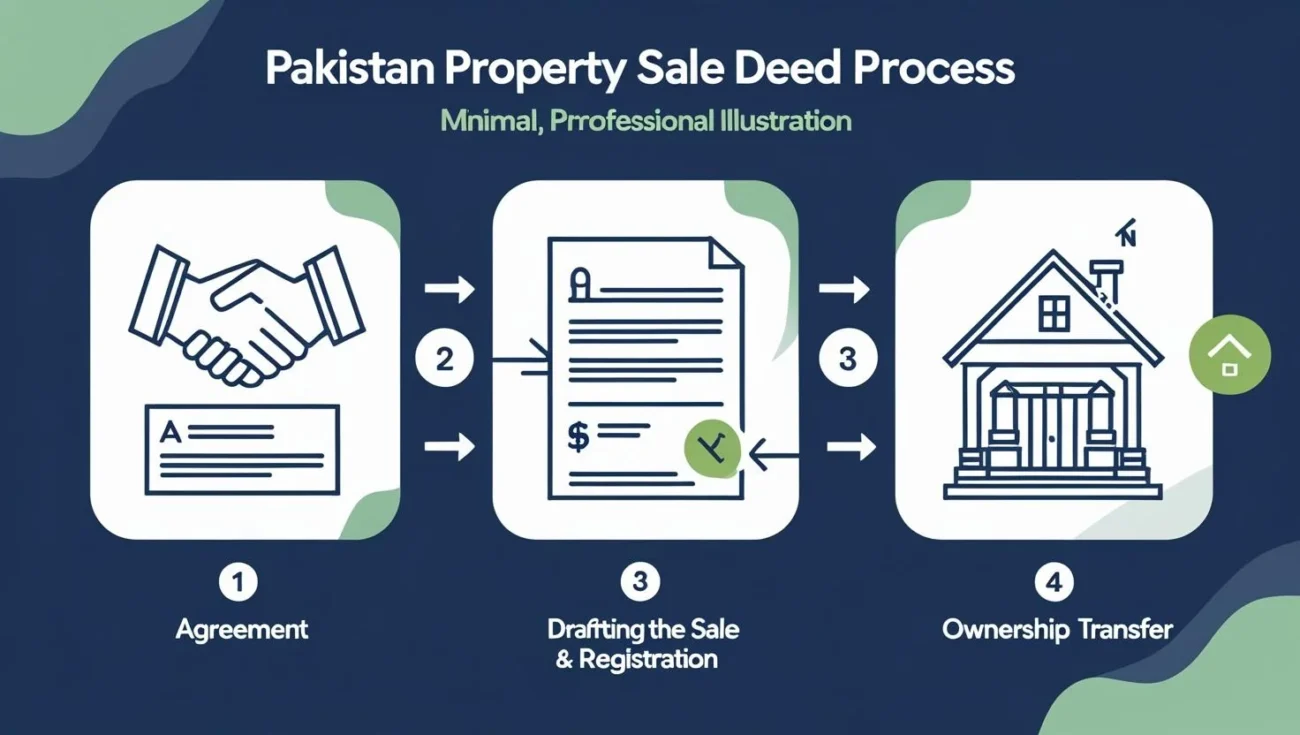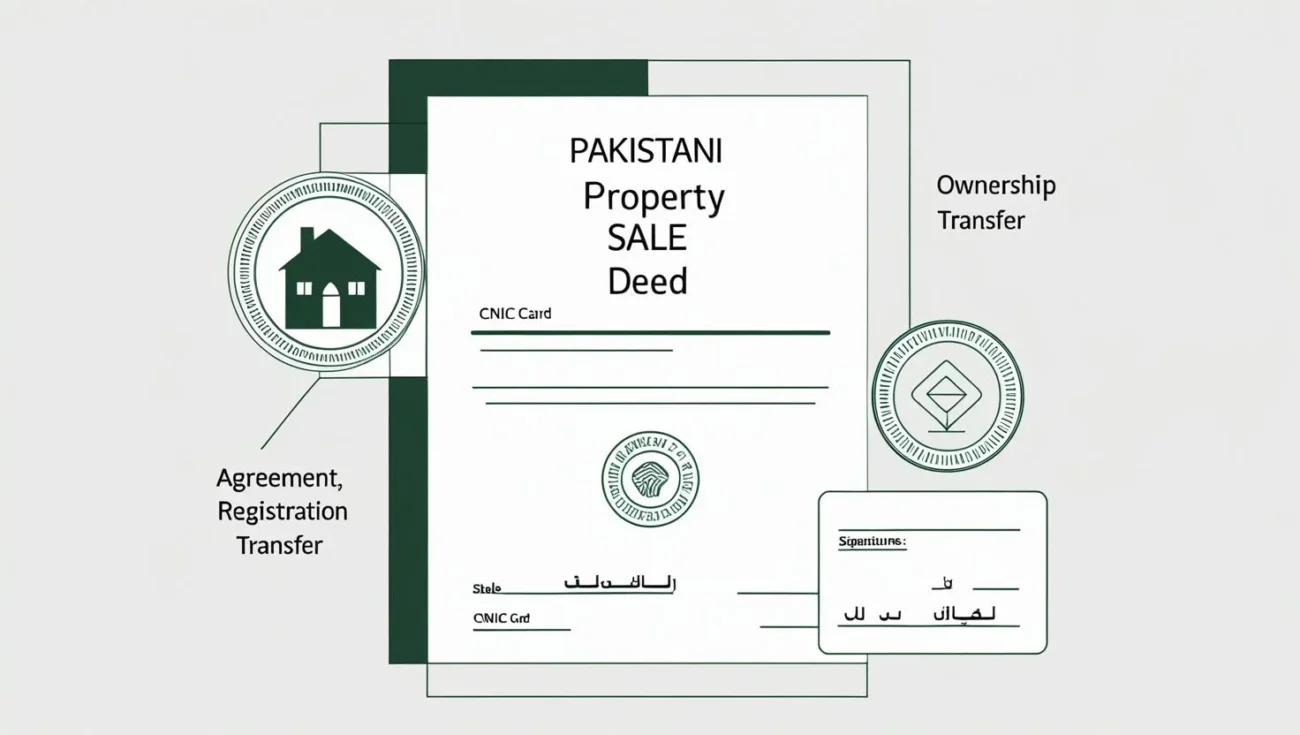In the real estate industry and property market in Pakistan, the sale deed is one of the most crucial legal documents. It acts as a record for the seller and buyer in the process of trading property. It is the legal record supporting the claim that a given property is offered for sale, and after the sale and purchase, it is legally documented. It is a complete property transaction document that is legally accepted by the courts or government institutions. In the realm of property dealings, the deed of sale constitutes a foundational legal document that formally documents the transfer of ownership.
Real estate transactions in Pakistan are done under a strict legal framework and the sale deed is a key document. It does not matter whether the property is residential, commercial or agricultural. The document functions as a legal assurance that ownership rights in the property have been duly transferred. It mitigates the risk of a dispute regarding the sale and purchase of the property.
Why You Must Have a Sale Deed in Pakistan
Pakistan’s legal system requires all transactions of a property to be recorded. In cases of ownership disputes, verbal or soft agreements hold no legal weight. The deed of sale serves as the binding document that secures the rights of both parties. It records the buyer’s commitment to payment and the seller’s confirmation of the successful transfer of property. It becomes the foundation for any changes to be made to land revenue records. A buyer faces the problem of correctly updating their name in the government registers without a properly documented sale deed, complicating future sales or claims of inheritance.
Types of Sale Deeds in Pakistan
In Pakistan, the types of deed of sale vary based on the specific terms of the property, as well as the transaction. Though every deed serves the same core purpose of demonstrating the change of ownership, the phrasing and structure may vary based on certain factors.
The most common form is the absolute deed of sale, in which full ownership is received by the buyer after the payment is made. A different type is the conditional deed of sale, in which certain terms must be achieved for the ownership transfer to be final, such as payment of all installments or the fulfillment of the contract. Certain sale deeds which are recognized by the local land record offices also exist for the transaction of agricultural land in some rural areas.
These differences illustrate that the core intent may be identical, but a variety of property types and local stipulations affect the differences in structure and clauses of the document.

Role of a Sale Deed in Property Deals
In Pakistan, a deed of sale serves the vital purpose of legally verifying the sale and purchase of property. The drafting of a deed of sale occurs subsequent to the consensus of both parties regarding the transaction’s terms, price, and conditions. Upon signing, the deed becomes binding on both parties, preventing either from denying the agreed terms.
As a mandatory legal document, the sale deed is required in nearly all types of property transactions, including residential and commercial plots, houses, multi-storey apartments, commercial plazas, and agricultural land. Additionally, sale deeds are required by banks and other financial institutions when property is offered as collateral for loans. In addition, in property disputes, the deed of sale is the first document presented in court to prove ownership and it is a deed of evidence.
Structure of Sale Deed in Pakistan
In Pakistan, sale deeds follow a uniform legal format. It entails an introduction of the parties, full names, addresses, and CNIC numbers. Thereafter, the property is described including its size, location, and boundaries. The sale price is also mentioned prominently and the agreed price between buyer and seller is termed as consideration amount.
The document also contains a declaration from the seller stating he is the legal owner of the property and that there are no disputes or claims against the property. The buyer’s information, along with payment receipt confirmation, is also listed. Lastly, the deed of sale requires the signatures of both parties, witnesses, and the attesting authority for it to be legally binding.
This structure makes certain that no confusion exists, and all the important information is captured to minimize the possibility of disputes later.
Registration of Sale Deed in Pakistan
In Pakistan, the deed of sale must be registered. The registration of property transactions is governed by the Registration Act of 1908, which obligates the registration of each transaction of property in the appropriate land office. Hence, it allows the government to have a proper record of the transfer of ownership.
At the time of registration, the parties have to appear in person before the sub-registrar in the area in which the property is located. The registrar confirms both parties’ identities, examines the document for forgery, and then updates the official land record with the transfer. There are also Stamp duty and registration fees to be paid depending on the province. In the absence of registration, the sale deed is of no value legally and is unlikely to be accepted during a property dispute.
Legal Importance of Sale Deed
In Pakistan, the deed of sale bears immense legal significance. It not only confirms that a sale has been completed, but it also maintains the formal chronological order of the transfer of ownership throughout history. The courts place significant scrutiny on this document when resolving legal matters, and it further serves the purpose of fraud prevention. Once the deed is registered, no two parties can claim ownership of the property.
For inheritance matters, the deed of sale serves as a vital document for determining the rightful heirs and allocating assets. It is also relevant for the government in matters of acquisitions, housing schemes, and urban development projects where the ownership information is verified through registered deeds.

Problems Encountered in Sale Deed Transactions
While of great importance, the sale deed poses a number of challenges during its registration. The rampant issues of fictitious ownership claims and forged documents worsen the already prevalent nepotism and corruption within land revenue offices. Legal battles can also arise when multiple purchasers attempt to claim ownership of a single purportedly sold property.
Another problem is the lack of awareness among the public regarding the correct process. Some people use informal contracts or verbal agreements, which later lead to serious disputes regarding ownership. This underscores the necessity of having some form of legal education and the need to depend on registered sale deeds exclusively.
The Digitization of Land Records
In the past few years, Pakistan has made efforts to digitize land records to streamline the deed of sale process. The Punjab Land Records Authority and the Sindh Board of Revenue have implemented online verification mechanisms for property transactions. These reforms are designed to mitigate fraud, curtail intermediary involvement, and enhance the efficiency of the registration process. Dedicated to improving the experience of buyers and sellers, these modern trends allow the verification of property records prior to executing a sale deed, ensuring the absence of disputes. This technological advancement in land record management is helping to restore faith in the real estate sector of Pakistan.
Concluding Thoughts
In Pakistan, the deed of sale is the foundation of any property transaction. It is not simply a document, as it functions as a contract in law which guarantees the interests of both the buyer and seller. Its types and usages, formats and registrations, and every step of this document is critical.
As people become more aware, as a result of education, technology, and better laws, correctly documented sale deeds are increasingly being accepted throughout the country of Pakistan. Everyone who participates in the buying or selling of a property should know how to appreciate the importance of this document. Proper execution and registration of sale deeds greatly enables buyers and sellers of property to avert the conflicts of law and effectively safeguard their rights over the properties.


